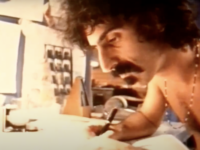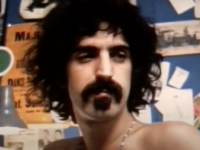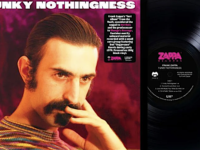This concludes a series from Mick Raubenheimer examining ‘Joe Garage,’ the three-part rock opera released by Frank Zappa in September and November 1979:
Chapter four: The ugliness aesthetic.
Frank Zappa’s apparently infantile attraction to the icon of Ugly runs amok throughout Joe’s midi-tragic pseudo-demise: Mustachioed Catholic honeys; unpronounceable itches; compromised wet titties (and big ‘uns..); gay robots “plooked” to death; sales execs sucking one another off, et al.
And yet, echoing along these sordid symbolscapes, a painfully melancholic watermelon croons its ballad.
Almost each of Zappa’s cruddy poems are submerged in rare, intricate and idiosyncratically wonderful instrumental patterns (or, abstract communications) – on Joe’s Garage these sublime and dark beauts perpetuate the entire audio-script, ripe examples: The instrumental interlude in the song “Fembot in a Wet T-Shirt,” the rhythmically implausible resolution to “Keep It Greasey,” the completely unrelated instrumental description of the emotional/psychological state of a groupie “On the Bus,” the melancholic, grandiose eloquence of guitar solos “He Used To Cut the Grass,” “Outside Now” and “Watermelon in Easter Hay” – the latter one of the most emotionally affecting pieces ever executed on six strings.
For Frank Zappa, sucking cock, dark desires, dirty love, etc. are not images of ethically compromising physical situations: The elements involved are symbolic … and symbolic of that much-censored drive toward communication of self, sexual desire as symbolic of the urgent drive in individuals to communicate the Self – that which you are, your individual consequentiality/meaning.
This, of course, is also one of the underlying meanings of art – communication of the special self, the unique, the individual, and its experience of reality.
Note that sucking cock, dark desires and yes even dirty love are only compromising and sad (:ugly) in contexts that suppress the original impulse. See the likes of Freud, Jung and Wilhelm Reich applaud.
In a healthy Sunshine, the above become nubile, virile expressions of Life (:pretty). Dirty love becomes consensually naughty sex positions, Dark desires become passionate motivations, and sucking cock becomes … well, fellatio.
Alchemy: Ugly becomes beautiful.
Joe’s Garage is ultimately concerned with the veiled but essential nihilism of censorship, and its ethical guise: “We suppress what is wrong (for the undifferentiated masses), in order to preserve the quality of life of the (dead-eyed, molded, undifferentiated) masses.”
For Zappa, reality only has meaning through the individual.
Any social reality bred in the dogmatic soil of some ideologically fixed/set Governing body is worthless, according to him – an exercise in the anti-human. Artless, void of aesthetics, bereft of passion.
Two things capture the individual-as-concept for Zappa: Sex and art. What conjoins the two is passionate frustration towards communication of the individual self: Art being sex’s abstract incestuous sibling. This why Zappa’s art is so saturated with sexual imagery.
He relishes in the unsayable, in the aesthetic possibilities lurking behind conceptual iron curtains: Sweet, devoted young Catholic women (all light pinks and golden halo) sucking mean fat hairy cock in the Confessional acquire potent down on their upper lips – signifying growth, evolution.
Frank Zappa is all about erectile tissue …
When scolding studio musicians on their “to-the-note” translations of musical scores (i.e. their sterile renditions of fertile ink), Zappa says: “Give it eyebrows!” (He might as well have exclaimed “Give it beard,” for here eyebrows refer to the arsenalizing of the latent brow … making it say something.)
In the album Uncle Meat, a mad professor invents a gargantuan machine which emits powerful beams reducing bland innocent victims to a palpitating, paralyzed state swooning in wild sexual fantasies. The “affected” individuals stand up (a good palpitation later) markedly different in two respects – strange eyes and hugely elongated noses.
The noses have grown in order to accommodate the subjects’ newly amplified grey matter. (They’re also phallic – representing powerful new patterns bent on fertilization, on spreading the new word / genetic codes.) The eyes represent, of course, new sight, new vision – new values.
For Zappa, censorship is bent on annihilating not only new possibilities, but also their attainment: For it not only forbids the new but also that in the self which desires the new.
The unsayable is then, for Zappa, the crucial, the potentially phenomenal: For the unsayable is either that which is suppressed (because it is dangerous, i.e. potentially disruptive of an established system, i.e. too potent), or that which hasn’t yet been found (the unconceptualizable – those patterns outside received awareness).
Here we find Frank Zappa’s aesthetic – to reveal the presence or possibility of new patterns – and, implicitly, new values.
- How the Pixies Changed Everything With ‘Surfer Rosa’ - July 12, 2023
- Frank Zappa – ‘Funky Nothingness’ (2023) - June 30, 2023
- How Jim White’s ‘Wrong-Eyed Jesus!’ Changed My Mind About Country Music - June 14, 2023




